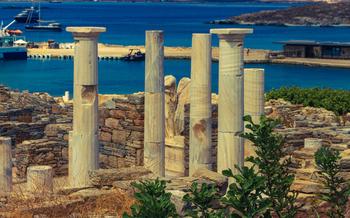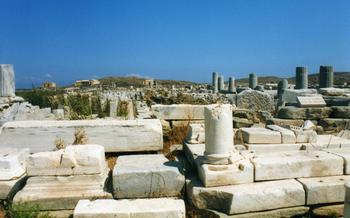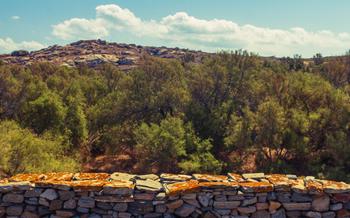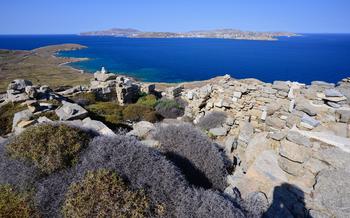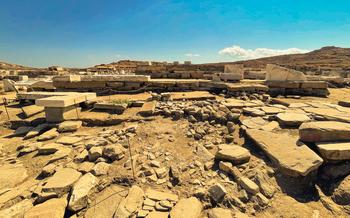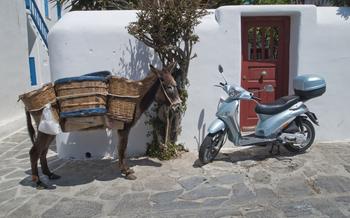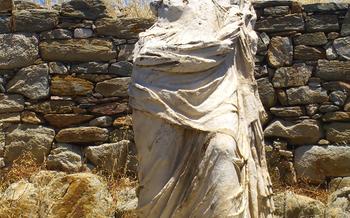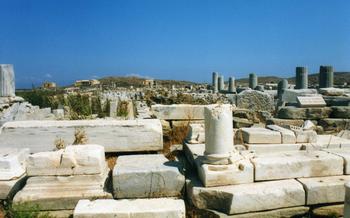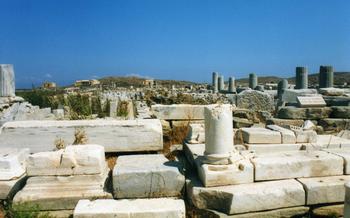
Possidonia
- Hermoupolis, the Capital of Cyclades
- Possidonia, the Sunken City:
- Planning Your Visit
- Transportation to Possidonia:
- Snorkeling and Diving in Possidonia
- Exploring the Archaeological Site
- Understanding the Archaeological Significance
- Capturing the Beauty
- Local Cuisine and Culinary Delights:
- Cultural Experiences in Hermoupolis:
- Island Hopping from Hermoupolis
- Sustainability and Responsible Tourism
- Safety Precautions for Underwater Exploration:
- Insider Tip: Unveiling the Hidden Treasures of Possidonia
Hermoupolis, the Capital of Cyclades
Hermoupolis, the captivating capital of the Cyclades, beckons travelers with its rich history, architectural wonders, vibrant cultural scene, and strategic location as a gateway to the Aegean's island-studded paradise. Founded in the mid-19th century, Hermoupolis proudly bears the legacy of its cosmopolitan past, evident in its grand neoclassical mansions, stately churches, and the imposing Town Hall, a masterpiece of 19th-century architecture. The city pulsates with life, offering a captivating blend of traditional Greek charm and modern amenities, inviting visitors to delve into its vibrant tapestry of culture, history, and natural beauty. From exploring its fascinating museums and art galleries to savoring delectable culinary delights at charming waterfront restaurants, Hermoupolis promises an unforgettable journey through the heart of the Cyclades. Moreover, its convenient location makes it an ideal starting point for island hopping adventures, allowing travelers to seamlessly embark on a voyage of discovery across the enchanting Aegean Sea.
Possidonia, the Sunken City:
Nestled beneath the azure waters of the Aegean Sea, just a short distance from the vibrant port city of Hermoupolis, lies the captivating sunken city of Possidonia. This ancient metropolis, submerged by a catastrophic earthquake in the 5th century BC, offers a glimpse into a bygone era, inviting explorers to unravel its secrets.
Possidonia, once a thriving port town, was a significant center of trade and commerce in ancient Greece. Its strategic location, at the crossroads of major sea routes, allowed it to flourish and establish connections with various civilizations throughout the Mediterranean. Tragically, a cataclysmic earthquake shook the region, causing the city to sink beneath the waves, forever preserving its structures and artifacts in an underwater time capsule.
In the 1950s, the captivating ruins of Possidonia were discovered by sponge divers, revealing a wealth of well-preserved remains. Subsequent archaeological expeditions have unearthed impressive buildings, intricate mosaics, and an array of artifacts that provide valuable insights into the city's rich history and culture.
Adding to the allure of Possidonia are the captivating myths and legends woven around its sunken existence. One tale speaks of a beautiful princess who, in a tragic twist of fate, was cursed to live beneath the sea, forever guarding the city's secrets. Another legend tells of a hidden treasure, concealed within the ruins, waiting to be discovered by a worthy explorer.
Planning Your Visit
To make the most of your Possidonia experience, careful planning is essential. The best time to visit is during the summer months (June to September) when the weather is warm, and the waters are calm, providing optimal visibility for snorkeling and diving. Aim to stay for at least two days to fully explore the underwater ruins and immerse yourself in the cultural attractions of Hermoupolis.
For accommodation, Hermoupolis offers a range of options to suit different budgets and preferences. From charming boutique hotels to cozy guesthouses, there are plenty of places to choose from. To ensure a hassle-free experience, book your accommodation in advance, especially during the peak season.
To explore Possidonia, several reputable tour operators offer guided snorkeling and diving tours. These tours provide a safe and informative experience, with knowledgeable guides who can share insights into the history and significance of the site. Alternatively, if you're an experienced diver, you can rent equipment and explore independently.
Transportation to Possidonia:
To reach Possidonia from Hermoupolis, there are two main transportation options: ferries and private boat rentals. Ferries offer a convenient and affordable way to get to the sunken city. Several companies operate daily ferry services from Hermoupolis to the small port of Ormos Apollonias, located on the island of Sifnos. The journey takes approximately 45 minutes to 1 hour, and tickets can be purchased at the port or online.
If you prefer a more personalized experience, you can rent a private boat with a skipper who can take you directly to the dive site. This option is ideal for groups or individuals who want to explore the underwater ruins at their own pace. Several local boat rental companies offer half-day or full-day rentals, and prices vary depending on the size and type of boat.
To avoid disappointment and ensure a smooth journey, it's advisable to book your ferry tickets or private boat rental in advance, especially during the peak tourist season. Check the ferry schedules carefully and plan your trip accordingly to avoid long waiting times.
Snorkeling and Diving in Possidonia
Possidonia offers an immersive experience for snorkelers and divers of all levels. The crystal-clear waters provide excellent visibility, allowing you to explore the ancient ruins and marine life up close. The underwater landscape is teeming with vibrant coral reefs, colorful fish species, and playful dolphins.
For those new to snorkeling, guided tours are available to ensure your safety and provide insights into the underwater world. These tours typically include equipment rental and instruction on proper snorkeling techniques. If you prefer a more independent exploration, you can rent snorkeling gear from local shops and venture out on your own.
For experienced divers, the deeper waters of Possidonia reveal even more wonders. You can explore shipwrecks, underwater caves, and ancient artifacts that have been submerged for centuries. Certified dive operators offer guided dives catering to different skill levels, ensuring a safe and memorable experience.
Exploring the Archaeological Site
The underwater ruins of Possidonia lie just off the coast of Hermoupolis, inviting visitors to immerse themselves in the depths of history. The site features a remarkable collection of ancient structures, including the remains of houses, temples, and fortifications. Archaeologists have uncovered numerous artifacts of great historical significance, including pottery, tools, and jewelry, shedding light on the daily lives and customs of the city's inhabitants.
One of the most notable structures is the Temple of Apollo, a magnificent edifice that once stood as a testament to the city's religious devotion. The temple's imposing columns and intricate carvings offer a glimpse into the architectural prowess of the ancient Greeks. Other notable ruins include the city walls, which once protected Possidonia from invaders, and the agora, where bustling markets and public gatherings took place.
The artifacts discovered at Possidonia provide valuable insights into the city's past. Pottery fragments reveal intricate designs and motifs, while tools and utensils offer clues about the daily tasks and occupations of the city's inhabitants. Jewelry and other ornaments showcase the artistic skills and craftsmanship of the ancient Greeks. These artifacts not only tell the story of Possidonia but also contribute to our understanding of ancient Greek civilization as a whole.
Ongoing research and conservation efforts are underway to further explore and protect the sunken city. Underwater archaeologists continue to map the site and uncover new artifacts, while conservationists work to preserve the delicate remains from further deterioration. By learning more about Possidonia, we gain a deeper understanding of the rich history and cultural heritage of Greece, while also contributing to the preservation of this unique underwater treasure.
Understanding the Archaeological Significance
Possidonia's archaeological significance extends far beyond its physical remains. The city's strategic location made it a vital hub for maritime trade in the ancient world. Excavations have uncovered evidence of trade relations with various civilizations, including pottery, coins, and imported goods from across the Mediterranean. This highlights Possidonia's role as a cultural melting pot, where ideas, technologies, and goods were exchanged, contributing to the development of the broader Mediterranean civilization.
Underwater archaeology in Greece plays a crucial role in shedding light on the country's rich maritime past. Possidonia is a prime example of how underwater exploration can uncover lost worlds and provide valuable insights into ancient societies. The ongoing research and conservation efforts at the site are essential for preserving this unique cultural heritage and ensuring its accessibility for future generations.
Preserving Possidonia's underwater ruins poses unique challenges. The site's exposure to marine elements, such as salt water and strong currents, requires specialized conservation techniques to prevent further deterioration. Ongoing research aims to develop innovative methods for protecting and stabilizing the submerged structures while minimizing the impact on the surrounding marine environment.
Despite the challenges, Possidonia represents an extraordinary opportunity to explore and understand the complexities of ancient maritime civilizations. The site holds immense potential for further discoveries that could shed light on the interconnectedness of the ancient world and the evolution of Mediterranean cultures.
Capturing the Beauty
The sunken city of Possidonia offers a unique opportunity for underwater photography enthusiasts. The crystal-clear waters and vibrant marine life create a picturesque backdrop for capturing stunning images. To make the most of your underwater photography experience, consider the following tips:
-
Use a Waterproof Camera or Housing: Invest in a high-quality waterproof camera or a waterproof housing for your DSLR camera to protect your equipment from water damage.
-
Choose the Right Lens: A wide-angle lens is ideal for capturing panoramic shots of the underwater ruins and marine life.
-
Adjust Your Settings: Set your camera to the appropriate white balance and ISO settings to ensure accurate color reproduction and minimize noise.
-
Use Natural Light: The best time to take underwater photos is during the day when natural light is abundant. Avoid shooting directly into the sun, as this can cause overexposure.
-
Take Your Time: Be patient and take your time to compose your shots. Look for interesting angles and perspectives that showcase the unique features of the sunken city.
-
Respect the Environment: Remember that Possidonia is a protected archaeological site. Be mindful of your surroundings and avoid touching or disturbing the underwater ruins or marine life.
Local Cuisine and Culinary Delights:
Indulge in the culinary delights of Hermoupolis, where traditional Greek cuisine meets fresh seafood and local specialties. Savor the flavors of mouthwatering dishes like moussaka, pastitsio, and gemista, all prepared with fresh, locally-sourced ingredients. For a taste of the sea, try grilled octopus, succulent shrimp, or freshly caught fish cooked to perfection.
Explore the charming tavernas and restaurants that line the picturesque waterfront, offering breathtaking sea views and a vibrant atmosphere. Enjoy a leisurely lunch or dinner while watching the sun set over the Aegean Sea. Don't miss the opportunity to participate in culinary workshops or cooking classes, where you can learn the secrets of Greek cuisine and create your own delicious dishes using local ingredients.
Cultural Experiences in Hermoupolis:
Hermoupolis is not just a gateway to underwater wonders but also a vibrant cultural hub. Delve into the island's rich history and traditions through its museums and art galleries. Discover the Archaeological Museum of Syros, housing artifacts from the ancient city of Hermoupolis and other Cycladic islands. Immerse yourself in contemporary art at the Municipal Art Gallery, showcasing works by local and international artists.
Experience the lively cultural scene of Hermoupolis by attending traditional music and dance performances. Every summer, the island hosts numerous festivals and events, including the Syros International Film Festival, showcasing independent films from around the world. Don't miss the chance to witness the vibrant "San Giovanni" festival in June, featuring traditional dances, music, and processions.
Indulge in the local crafts and traditions by exploring the charming shops and boutiques in Hermoupolis. Pick up unique souvenirs and handmade items, such as ceramics, woven textiles, and jewelry, to cherish your memories of this enchanting island.
Island Hopping from Hermoupolis
Hermoupolis' strategic location in the heart of the Cyclades makes it an ideal starting point for island hopping adventures. Several nearby islands can be easily reached by ferry from Hermoupolis, offering diverse experiences and breathtaking landscapes.
Popular Day Trip Destinations:
-
Syros: Explore the neighboring island of Syros, home to beautiful beaches, charming villages, and the medieval town of Ano Syros.
-
Delos: Take a day trip to the uninhabited island of Delos, a UNESCO World Heritage Site, and the birthplace of the Greek gods Apollo and Artemis.
-
Mykonos: Indulge in the vibrant nightlife and cosmopolitan atmosphere of Mykonos, known for its stunning beaches, trendy restaurants, and lively bars.
-
Tinos: Discover the religious and cultural heritage of Tinos, renowned for its iconic church, Panagia Megalochari, and picturesque villages.
Ferry Routes and Schedules:
Ferries to neighboring islands depart frequently from Hermoupolis port. Check ferry schedules and book tickets in advance, especially during the peak tourist season.
Suggested Itineraries:
-
1-Day Itinerary: Embark on a day trip to Delos to explore the ancient ruins and immerse yourself in Greek mythology.
-
2-Day Itinerary: Combine a visit to Syros with a stop at the sacred island of Tinos, experiencing the unique blend of history, culture, and natural beauty.
-
3-Day Itinerary: Create a custom island-hopping route, choosing from destinations such as Mykonos, Paros, or Naxos, and enjoy the diversity of the Cycladic islands.
Tips for Planning:
- Research ferry schedules and fares to plan your itinerary efficiently.
- Consider booking ferry tickets online to secure your seats and avoid queues.
- Pack light for island hopping, as you'll be moving between different destinations.
- Allow ample time to explore each island and avoid rushing your experiences.
Sustainability and Responsible Tourism
As responsible travelers, it is crucial to minimize our impact on the delicate marine environment of Possidonia. Here are some practices to keep in mind:
- Respect the Underwater Environment: Avoid touching or disturbing marine life, and refrain from collecting souvenirs from the site.
- Dispose of Waste Properly: Bring your own reusable water bottle and avoid single-use plastics. Dispose of waste responsibly in designated bins to prevent marine pollution.
- Support Local Businesses: Choose local tour operators and guides who prioritize sustainable practices. Support local restaurants and shops that use locally sourced ingredients and products.
- Educate Others: Share your knowledge about responsible tourism with fellow travelers and help raise awareness about the importance of protecting underwater heritage.
By embracing responsible tourism practices, we can help preserve the beauty and integrity of Possidonia for future generations to explore and enjoy.
Safety Precautions for Underwater Exploration:
When embarking on an underwater adventure in Possidonia, safety should be your top priority. Snorkeling and diving require proper training and certification to ensure your comfort and safety while exploring the sunken city.
Before diving, it's crucial to consult with local dive centers or instructors who can provide guidance and ensure you have the necessary skills and equipment. They can also brief you on the specific conditions and potential hazards at the dive site.
Health considerations are equally important. If you have any pre-existing medical conditions, consult with your doctor before diving. It's also advisable to have adequate travel insurance that covers diving activities.
Before diving, make sure to check the weather conditions and sea state. Strong currents or poor visibility can affect your safety, so it's best to postpone your dive if conditions are not favorable.
Once underwater, remain calm and aware of your surroundings. Maintain buoyancy control and avoid touching or disturbing marine life. Always dive with a buddy and communicate using hand signals or underwater communication devices.
In case of any emergency, remain calm and signal for help using your dive computer or by surfacing and waving your arms. Local dive centers have emergency protocols in place, so it's crucial to follow their instructions and seek assistance if needed. By adhering to safety guidelines and taking necessary precautions, you can ensure a safe and enjoyable underwater exploration of Possidonia.
Insider Tip: Unveiling the Hidden Treasures of Possidonia
To truly immerse yourself in the magic of Possidonia, consider planning your visit during the tranquil shoulder seasons of May-June or September-October. During these months, the crowds diminish, allowing you to experience the underwater wonders of the sunken city in a more intimate and serene setting.
The off-season also presents an opportunity for personalized experiences and interactions with local guides and experts. Take advantage of smaller group sizes for guided snorkeling or diving tours, ensuring more attentive service and the chance to delve deeper into the fascinating history and significance of Possidonia.
Whether you're an avid history buff, an underwater enthusiast, or simply seeking a unique and awe-inspiring travel experience, visiting Possidonia during the off-season offers a truly unforgettable journey into the depths of Greece's rich maritime heritage.

